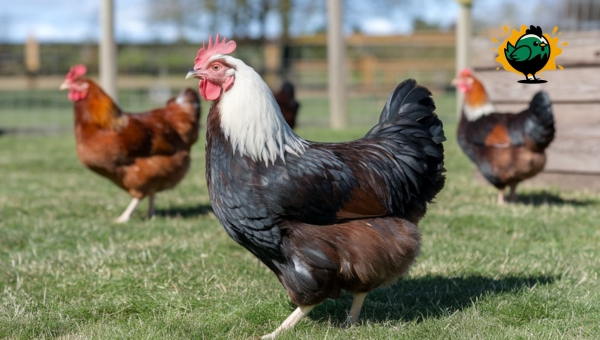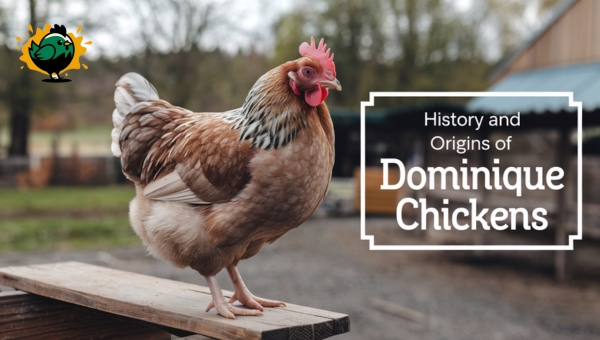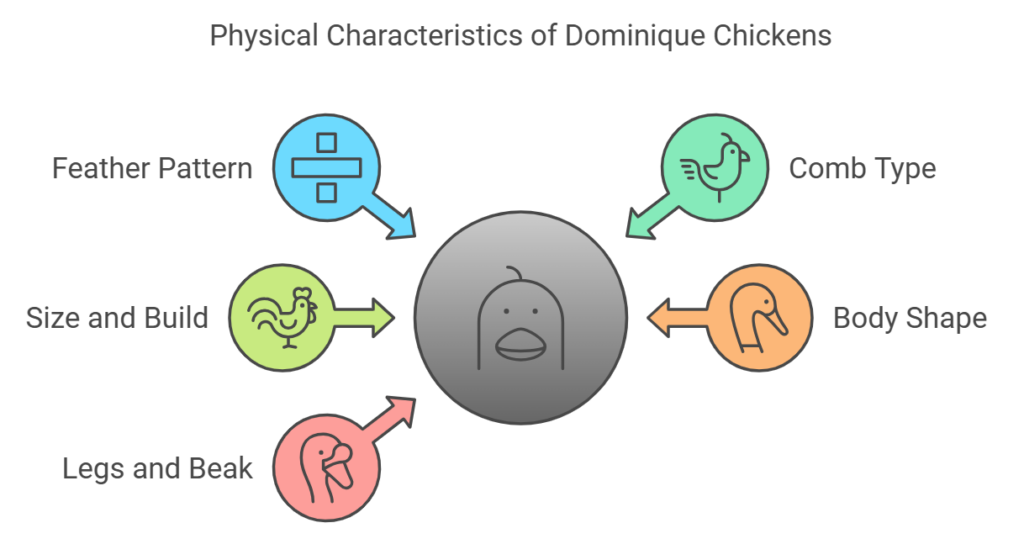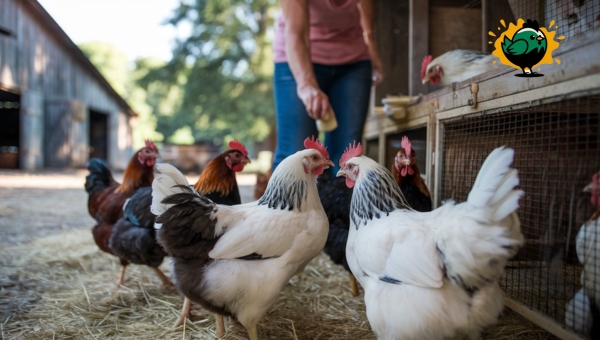Dominique Chicken | The Heritage Breed You Need to Know

Going back in antiquity, farms flourished with traditional breeds, each possessing its own allure. The Dominique chicken has a long history that stretches back to colonial times and is frequently regarded as the original chicken breed in America.
Known for its striking appearance and gentle disposition, this breed has been a staple in homesteads for centuries. Whether you’re a seasoned poultry enthusiast or a curious newcomer, the Dominique chicken offers a fascinating glimpse into the world of heritage breeds. Explore its origins, characteristics, and care requirements to discover why this breed remains a beloved choice among chicken keepers today.
History and Origins of Dominique Chickens
Dominique chickens, often regarded as America’s oldest breed, boast a rich history dating back to the colonial era. These chickens, primarily raised for both meat and eggs, emerged from a mix of European breeds brought by early settlers.

Their distinctive barred plumage made them popular among farmers, who appreciated their adaptability and resilience. In the 19th century, the breed gained prominence and was officially recognized as a standard breed in 1874 by the American Poultry Association.
Despite facing near extinction in the mid-20th century, dedicated breeders worked tirelessly to revive their numbers. Today, the Dominique chicken symbolizes the resilience and pioneering spirit of early American agriculture, continuing to be cherished for its historical significance and utility in small-scale farming.
Physical Characteristics
Dominique chickens are notable for their distinctive features, making them easily recognizable.

Here’s a concise overview of their physical characteristics:
- Feather Pattern: They have a unique black and white barred feather pattern, often referred to as “hawk coloring.”
- Comb Type: These chickens possess a rose comb, which is flat and low, offering protection against frostbite.
- Size and Build: Dominiques are medium-sized birds, with males typically weighing around 7 pounds and females about 5 pounds.
- Body Shape: Their bodies are broad and full, providing a robust appearance.
- Legs and Beak: They have yellow legs and a short, stout beak, adding to their overall charm.
These characteristics contribute to their popularity among poultry enthusiasts.
Also Read: Broody Chickens – Managing This Special Behavior
Egg Production and Brooding
When it comes to egg production and brooding, Dominique chickens stand out with specific qualities that appeal to many poultry enthusiasts. Let’s explore their egg-laying capabilities and unique brooding habits to understand why they might be a suitable choice for your backyard or farm.
Egg Laying Capabilities
Dominique chickens are known for their reliable egg production. They typically lay medium-sized brown eggs, averaging about 3 to 4 eggs per week.
This breed is not only efficient but also known for its year-round laying tendencies, making them a consistent choice for those looking to maintain regular egg production. Their hardy nature ensures that they can continue to lay even in colder temperatures, providing a steady supply of eggs.
Brooding Habits
In terms of brooding, Dominique chickens exhibit moderate tendencies. They are known to be attentive mothers, often showing natural instincts to care for their young.
While not all Dominiques will brood, those that do tend to be quite dedicated. This characteristic can be beneficial for those interested in natural chick rearing, as it allows for a self-sustaining flock with minimal intervention.
Raising Dominique Chickens
Raising Dominique chickens can be a rewarding experience, especially for those interested in heritage breeds. These birds are known for their hardiness and adaptability, making them a great choice for backyard flocks. To ensure they thrive, it’s essential to provide the right housing and nutrition. Let’s look at what it takes to keep these chickens healthy and productive.

Housing and Environment
When it comes to housing Dominique chickens, space and ventilation are key. They require a coop that offers protection from harsh weather and predators.
The coop should have:
- Adequate space: Allow at least 4 square feet per bird.
- Proper ventilation: Ensure fresh air circulation to prevent respiratory issues.
- Secure nesting boxes: Provide clean and comfortable spaces for egg-laying.
- Outdoor access: A safe, fenced area for roaming and foraging.
Feeding and Nutrition
Nutrition is vital for the growth and health of Dominique chickens. A balanced diet should include:
- Quality feed: Use a commercially-prepared chicken feed that meets all nutritional needs.
- Fresh water: Keep clean water available at all times.
- Supplemental grains and greens: Offer grains and fresh greens to encourage natural foraging behavior.
- Calcium sources: Provide crushed oyster shells or similar supplements to support strong eggshell formation.
By focusing on these aspects, you can maintain a thriving flock of Dominique chickens.
Also Read: 10 Common Myths About Roosters Debunked
Health and Lifespan
When considering Dominique chickens, understanding their health and lifespan is essential for ensuring a thriving flock. These chickens, known for their resilience, can face certain health challenges. Knowing the common concerns and lifespan expectations can help in providing the best care possible.
Common Health Issues
Dominique chickens, like other breeds, can encounter health problems. Some common issues include:
- Parasites: Both internal and external parasites can affect them.
- Respiratory diseases: They can be prone to respiratory infections.
- Nutritional deficiencies: Lack of proper diet can lead to health complications.
Regular health checks and a clean living environment can help mitigate these issues.
Lifespan Expectations
Dominique chickens typically live around 8 to 10 years. Their lifespan can be influenced by several factors, including:
- Diet: A balanced diet is crucial for longevity.
- Living conditions: Clean and spacious housing promotes better health.
- Regular veterinary care: Early detection and treatment of health issues can extend their lifespan.
Providing comprehensive care can help in maintaining their health and enhancing their life expectancy.
Conclusion
Dominique chickens are a remarkable breed known for their rich history, unique physical traits, and efficient egg production. They have been a staple in many farms due to their adaptability and friendly nature. When raising these chickens, it’s important to provide a suitable environment and proper nutrition to ensure their health and longevity.
Understanding their common health issues and lifespan expectations can help in maintaining a healthy flock. By focusing on these aspects, Dominique chickens can be a valuable addition to any farm or backyard setup. If you found this information helpful, explore more insightful articles on our site to expand your knowledge!
